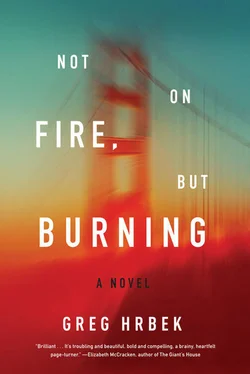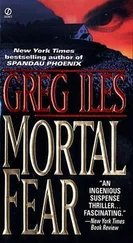“You Dorian?”
The drive to the camp is two hours. This guy in the bandanna, it turns out, is the counselor in charge of your cabin, which houses twelve campers for the two-week session: four boys from each of the major religious backgrounds (three from overseas: Israel, Switzerland, and the Islamic Republic of Palestine). “If I remember correctly,” he says, “you’re a not-practicing Christian.” Which leads into a conversation about your belief (or lack thereof) in God, and from there to a series of topics, including: organized religion, family, weather in Upstate New York, Major League Baseball, and the space-time continuum. Before you know it, you are in the mountain range, the peaks — those liftings of ancient rock (which had first appeared as blue ghosts in the far distance) — high around you now, green and bouldered, and the road curling through the gaps and saddles, no intersecting routes, only unpaved turn-offs into the forest, one of which will be the one that climbs about five hundred feet through the lowland conifers to a lake carved by a glacier, blue sky copy-merged onto the surface of the water, and a sign arching over the dirt road:
CAMP DAKOTA
So, now here you are — in a place where you will raft and rock climb, hike into the backcountry and pitch tents, build a fire and listen to the wolves (who, once endangered, thrive again in these mountains) howling from deeper in the wilderness; and, more than all this, where you will come to know children who share your ideals, with whom you will coexist and cooperate for a time, and later stay connected to via social media, creating a kind of intelligence able to span oceans and continents. The van stops in a pool of evergreen shadow, under crashing waves of insect sound.
“Loud, ain’t it?”
“Cicadas.”
He nods and leads you up the steps of the main lodge. “The Great Eastern Brood of 2038.”
After you have checked in and made your last call home and surrendered your phone, proceed to a little settlement of log cabins with the names of native peoples written above the doorways: Cherokee, Cayuga, Oneida. Inside the one named Poospatuck is where you will find him …
“Excuse me.”
A boy so absorbed in reading, he didn’t even notice your approach. But he sets the book down now and looks at you through eyes with brows slanted like accent marks, and says: “Are you my bunkmate?”
“I think so. This is three, right?”
“Three, yeah.” Sliding down from the top. “My name is Karim.”
“Dorian.”
“You cool with the bottom? We can switch if you want.”
“No, I’m good.”
While you unpack your duffel — clothes for a week, toiletries, a journal and a pen, a paper book, which he picks up and leafs through ( A Swiftly Tilting Planet ) — he explains that fire circle is in an hour and you’ll meet everyone else and tell them where you’re from and vice versa, though there isn’t any prohibition (he claims) against revealing the information ahead of time, so you say California and he says Geneva. Well, I’m not from Switzerland. I was born in America. He has an older sister. Me, too. Here, I brought real pictures. Isn’t it kind of cool, to hold them like this. And so on. The two of you finding it strangely and surprisingly easy to talk to one another, as it can be easy to talk once again to a friend from a long time ago, despite having gone down different paths.
Nature, like time, is a constant. Which is to say that, at every ( x = 0) coordinate on the grid — in the geographical region defined on many pathways (though by no means a majority) as the Northeastern United States — the Great Eastern Brood of 2038, also known as Brood X, also known as magicicada septendecim , is nearing the end of its lifecycle. The females, with knife-like ovipositors, have scored the bark of thick branches and laid their eggs in the slits, from which will come, two weeks hence, the nymphs. Born into a world without adults, without mothers or fathers (who by then will be dead), and perhaps this is why the children fall from the trees by the millions and burrow underground and don’t emerge for seventeen years: What they’re doing down there is mourning. As millions of people across the infinitude of the grid shall always be mourning, coping with every imaginable variation of loss. Every loss deserves a telling. What we have presented here is a fraction of a whole, no more representative of the total narrative than a single cell is representative of the living body of a person, just as every person described herein is, in like manner, a fraction of a greater whole of selves. And yet, even this limited picture provides us with a working equation describing the relationship between widely separated coordinates and their interconnectivity, including possible trans-path causalities. It has been posited that, in the near future (c. x = 500), an algorithm will be devised, complex enough to generate a full report of all diversifications: in other words, that infinity itself will be captured in its entirety. For the time being, this imperfect story of one family’s experience will have to suffice.
Thanks to the following people and organizations: Dede Hill, Melora Wolff, and Linda Simon, for generous help with many drafts; everyone at Melville House, in particular Taylor Sperry (editor), Dennis Johnson (publisher), and Adly Elewa (artist); the Steering Committee of the Ledig-Rowohlt Foundation, and everyone associated with the Château de Lavigny International Writers’ Residence; and Kathryn Davis, whose fiction showed me a better way forward and whose faith in this book was essential to its completion.
Greg Hrbek won the James Jones First Novel award for his book The Hindenburg Crashes Nightly . His short fiction has appeared in Harper’s magazine and numerous literary journals, and in The Best American Short Stories anthology. He is writer in residence at Skidmore College.












